What’s a musical genre without its albums, right? Whether it’s Bob Dylan’s “Bringing It All Back Home” for modern rock, the Beatles’ “Sgt Pepper’s Lonely Hearts Club Band” for pop music or Frank Sinatra’s “Songs for Swingin’ Lovers” for… Well, a whole lot of things (it’s a great album, what can I say), it’s usually albums, and not singles, that create genres, destroy them, reconstruct them and change their course. As it has been proven time and time again, a single good album can completely change the trends for years to come, and if its impact is deep enough, its influence could easily be felt in the genre forever. The same holds true for reggae as well – in fact, it might hold true for it more than for any other genre! There have been just so many fantastic, influential reggae albums over the genre’s life that if we were to list them all we’d be here all day! I can think of about a hundred right now, that’s how many great albums we got, it’s insane! But since I don’t have the time to describe them all and you don’t have the patience to read it, I’m only going to list a couple of the absolute best, most influential reggae albums of all time! Remember – this isn’t a top 5 list! Even though I’ve got some opinions on the matter, I’m not saying which albums are better and which one is the best, mostly because such a statement would be highly subjective. Instead, I’ve elected to describe the albums chronologically. Ready? Here we go!
The Harder They Come
Artist: Jimmy Cliff
Year: 1972
Amazon
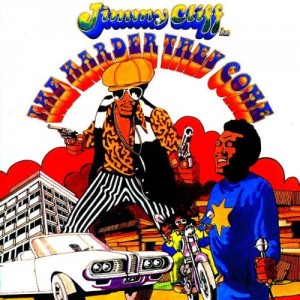 Remember back at the history page where I spoke about a Jamaican movie called “The Harder They Come”? You know, the one whose soundtrack was all reggae and helped jump-start the genre’s popularity in the West almost single-handedly? Well… This album is its soundtrack. And it is MAGNIFICENT! “The Harder They Come” is one of those very rare albums that solidify a genre, giving listeners a taste of just what exactly that kind of music is capable of. While it’s true that Jimmy Cliff has only contributed a couple of tracks to the album that bears his name, almost every single song here is pure gold. I don’t even know what else to say about it – this album made thousands of people fall in love with reggae, and it just might make you fall in love as well!
Remember back at the history page where I spoke about a Jamaican movie called “The Harder They Come”? You know, the one whose soundtrack was all reggae and helped jump-start the genre’s popularity in the West almost single-handedly? Well… This album is its soundtrack. And it is MAGNIFICENT! “The Harder They Come” is one of those very rare albums that solidify a genre, giving listeners a taste of just what exactly that kind of music is capable of. While it’s true that Jimmy Cliff has only contributed a couple of tracks to the album that bears his name, almost every single song here is pure gold. I don’t even know what else to say about it – this album made thousands of people fall in love with reggae, and it just might make you fall in love as well!
Catch A Fire
Artist: Bob Marley
Year: 1973
Amazon
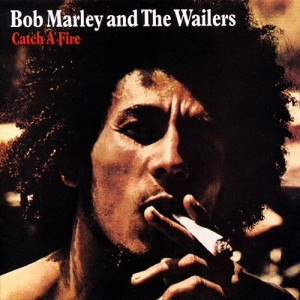 Bob Marley was not a perfect man, not by a long shot. He held some very questionable beliefs (which, indirectly, ended up costing him his life) and engaged in a lot of activities, like a number of affairs (some of which resulted in children) that would have been seriously looked down upon in modern society. Bob Marley was not the highest selling, most prolific or even the most famous reggae artist of his time. And yet, somehow, to this very day he has remained the face of the entire genre, with his likeness adorning numerous products and his music being fondly remembered even by people who don’t know anything about reggae. He has truly turned into a larger-than-life legend, and his albums can truly show us why. Out of all of them, I chose “Catch A Fire” to represent him, as I believe it represents its style flawlessly. It’s also the one with “Stir It Up”, so, y’know. If you haven’t listened to “Stir It Up”, just do yourself a favour and YouTube it right away, alright?
Bob Marley was not a perfect man, not by a long shot. He held some very questionable beliefs (which, indirectly, ended up costing him his life) and engaged in a lot of activities, like a number of affairs (some of which resulted in children) that would have been seriously looked down upon in modern society. Bob Marley was not the highest selling, most prolific or even the most famous reggae artist of his time. And yet, somehow, to this very day he has remained the face of the entire genre, with his likeness adorning numerous products and his music being fondly remembered even by people who don’t know anything about reggae. He has truly turned into a larger-than-life legend, and his albums can truly show us why. Out of all of them, I chose “Catch A Fire” to represent him, as I believe it represents its style flawlessly. It’s also the one with “Stir It Up”, so, y’know. If you haven’t listened to “Stir It Up”, just do yourself a favour and YouTube it right away, alright?
Legalize It
Artist: Peter Tosh
Year: 1976
Amazon
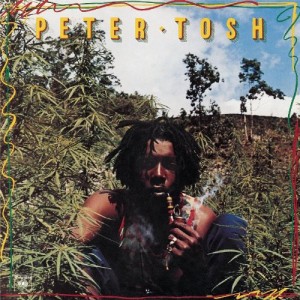 Well, it’s fun to see that weed lovers have been desperately trying to get their favourite recreational drug legalized for at least 40 years now. Peter Tosh, a founding member of The Wailers (Bob Marley’s band) who left the group in ’73 in order to pursue a solo career apparently wanted it legalized so badly that he named a single and his début album after the cause. Despite their controversial themes, the tracks on the album are still very, very solid, and a must-listen for every reggae fan out there. Too bad Peter Tosh seemed to forget that marijuana was not, in fact, legalized yet when he smoked a joint on stage in 1978, which resulted in his arrest and led to a downward spiral which ended his career. Regardless, “Legalize It” represents one of the pioneers of the reggae genre at arguably his finest, which definitely makes it worth a listen.
Well, it’s fun to see that weed lovers have been desperately trying to get their favourite recreational drug legalized for at least 40 years now. Peter Tosh, a founding member of The Wailers (Bob Marley’s band) who left the group in ’73 in order to pursue a solo career apparently wanted it legalized so badly that he named a single and his début album after the cause. Despite their controversial themes, the tracks on the album are still very, very solid, and a must-listen for every reggae fan out there. Too bad Peter Tosh seemed to forget that marijuana was not, in fact, legalized yet when he smoked a joint on stage in 1978, which resulted in his arrest and led to a downward spiral which ended his career. Regardless, “Legalize It” represents one of the pioneers of the reggae genre at arguably his finest, which definitely makes it worth a listen.
The Original Reggae Hitsound Of Desmond Dekker And The Aces
Artist: Desmond Dekker
Year: 1985
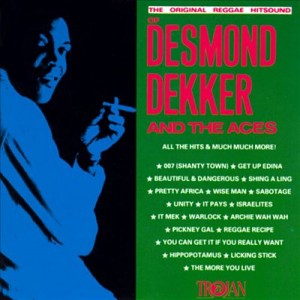 Boy, that’s a mouthful, isn’t it? Bob Marley is widely (and fondly) remembered as THE reggae artist, the man who popularized and perfected the genre, and for most people who just know about reggae from popular culture, he’s the face of the entire genre. However, for people who love reggae and have listened to quite a lot of albums, another name often pops in mind as the person who solidified and perfected it. That name, obviously, is Desmond Dekker. While Dekker didn’t have nearly as many albums as Marley did, he had just as many – if not more – absolutely amazing singles, a good chunk of which are collected in the Hitsound album, which is definitely worth a listen. The coolest thing about it is that it’s not only a fantastic collection for reggae fans, but also a great introduction to beginners, so either way there’s no excuse not to listen to “The Original Reggae Hitsound of Desmond Dekker And The Aces”!
Boy, that’s a mouthful, isn’t it? Bob Marley is widely (and fondly) remembered as THE reggae artist, the man who popularized and perfected the genre, and for most people who just know about reggae from popular culture, he’s the face of the entire genre. However, for people who love reggae and have listened to quite a lot of albums, another name often pops in mind as the person who solidified and perfected it. That name, obviously, is Desmond Dekker. While Dekker didn’t have nearly as many albums as Marley did, he had just as many – if not more – absolutely amazing singles, a good chunk of which are collected in the Hitsound album, which is definitely worth a listen. The coolest thing about it is that it’s not only a fantastic collection for reggae fans, but also a great introduction to beginners, so either way there’s no excuse not to listen to “The Original Reggae Hitsound of Desmond Dekker And The Aces”!
Foundation Ska
Artist: Skatalites
Year: 1996
Amazon
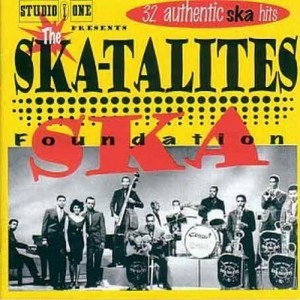 Don’t let the date deceive you – despite being released in 1996, all of the tracks on this album originated in 1963 and 1964. “Skatalites” are just one of numerous bands reggae band that popped up in the early 60s following the genre’s rise to popularity in Jamaica. They only existed for about 14 months, quickly being drowned in the sea of other successful reggae artists without even releasing a single album. They made quite a lot of singles, but they were never collected officially… Until 1996. You see, unlike most reggae bands of the time, which were mostly forgotten, for some reason “Skatalites” endured. Something about the band’s music remained – most likely a little something called “ska”, which is the sound that would remain an integral part of reggae throughout its history. Despite their initial dissolution in 1965, the band found new success and fame after being rediscovered over 20 years later, and they’ve been around ever since. Let’s just say, there’s a perfectly good reason for that.
Don’t let the date deceive you – despite being released in 1996, all of the tracks on this album originated in 1963 and 1964. “Skatalites” are just one of numerous bands reggae band that popped up in the early 60s following the genre’s rise to popularity in Jamaica. They only existed for about 14 months, quickly being drowned in the sea of other successful reggae artists without even releasing a single album. They made quite a lot of singles, but they were never collected officially… Until 1996. You see, unlike most reggae bands of the time, which were mostly forgotten, for some reason “Skatalites” endured. Something about the band’s music remained – most likely a little something called “ska”, which is the sound that would remain an integral part of reggae throughout its history. Despite their initial dissolution in 1965, the band found new success and fame after being rediscovered over 20 years later, and they’ve been around ever since. Let’s just say, there’s a perfectly good reason for that.

